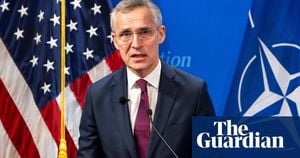The recent hostage video released by Hamas showing Edan Alexander, a dual American-Israeli national, has sparked outrage and deep concern, drawing swift condemnation from the White House. This troubling footage, lasting just over three minutes, depicts Alexander, who has reportedly endured captivity for over 420 days, pleading for his and others' release from Hamas's grip.
Sean Savett, spokesperson for the National Security Council, described the video as “a cruel reminder of Hamas’s terror against citizens of multiple countries, including our own.” He emphasized the harrowing circumstances faced by hostages like Alexander, who were taken during the brutal October 7 attacks. The Biden administration has underscored its commitment to securing the release of hostages held by Hamas, stating, “The war in Gaza would stop tomorrow and the suffering of Gazans would end immediately — and would have ended months ago — if Hamas agreed to release the hostages.”
During the video, Alexander appeared visibly distressed, urging the Israeli public not to forget about the hostages and to advocate for their freedom. His plea included criticisms aimed at both Israeli Prime Minister Benjamin Netanyahu and President-elect Donald Trump, expressing trust issues and discontent with the governmental response to hostage situations. “Please, people of Israel, go out to demonstrate every day and pressure the government. It is time to put an end to this nightmare,” Alexander implored.
He went on to address Trump directly, asking him to leverage his influence to negotiate for their release, highlighting the dire conditions within the confines of Hamas’s control. "Fear and isolation are killing us. Please do not forget us,” he stated poignantly. The emotional weight of Alexander’s cries was felt worldwide, accentuating the desperate need for action.
The video’s release coincides with months of failed international efforts to broker peace and secure the freedom of hostages. Nations have pushed hard for ceasefires, yet Hamas has shown reluctance to divert from its agenda. Alexander's parents have also been vocal, sharing their woes and the painful toll this ordeal has taken on their family. They have made public appeals to various officials, including Trump, stressing the urgency of rescuing their son.
Netanyahu responded to the video with renewed determination, assuring the public the Israeli government is doing everything possible to bring hostages home. His statement underlined the government’s focus on resolving the hostage situation alongside dealing with broader regional unrest.
Meanwhile, supporters and activists within Israel have organized demonstrations, echoing Alexander’s call for attention and action to support families with loved ones still imprisoned.
The situation remains dire, with humanitarian issues compounding the conflict. President Biden reiterated the emotional toll the enduring conflict has on civilians caught in the crossfire, recognizing the extensive suffering experienced by Palestinians amid this violence. "Far too many civilians have suffered far too much," he remarked during recent speeches.
While the hostage crisis endures, the administration continues to navigate sensitive diplomatic discussions aimed at finding resolutions to these multifaceted crises. With the conflict intensifying, families like Alexander's hope for intervention and relief.
Looking back, Edan Alexander’s story has become emblematic of the broader crisis, raising pressing questions about how to balance military strategies with humanitarian concerns. His parents strive to keep his story alive, sharing it with media outlets and leveraging interviews to carry the weight of their plight beyond borders, hoping it resonates with leaders sitting at negotiation tables.
It’s become abundantly clear through this situation: people often don’t just want to survive—they urge those holding power to act decisively and compassionately for the sake of lives hanging by threads.



